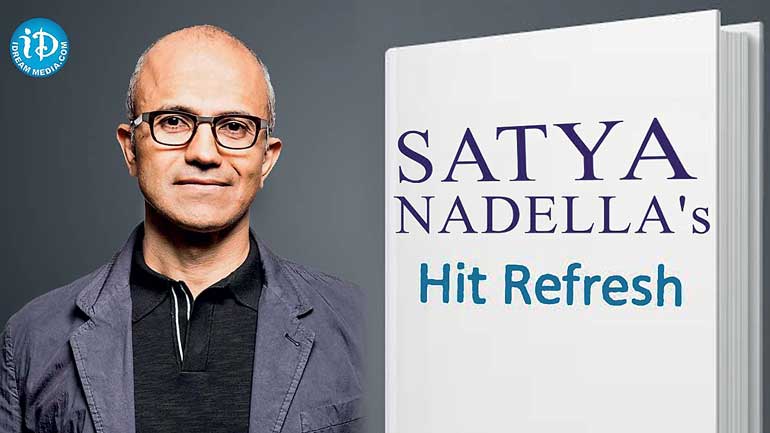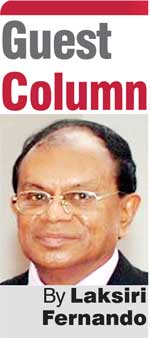Saturday Feb 07, 2026
Saturday Feb 07, 2026
Tuesday, 20 March 2018 00:00 - - {{hitsCtrl.values.hits}}

‘Drop the guns’ is my addition based on his own analysis, but ‘Hit Refresh’ is Satya Nadella’s main title of the quite praiseworthy book with a vision for everyone, not only in the technology field, but also in other areas of knowledge and vocations, or even in politics. ‘Drop the guns’ may be more appropriate for the eternally fighting ‘political species’.
It is a rare vision to come from a CEO of a multinational, to say the least. It is an imagination of a ‘better future for everyone’ intimately based on the author’s own experience within Microsoft, but blended in his South Asian upbringing under a ‘Marxist’ father, scholarly mother and perhaps his love for the game of cricket. If there are many more CEOs coming up with the same or a similar vision, the future of the world would be better, and the progress might come faster than ever.
What is his vision? 
To gather his future vision quickly, one could turn to his short and concise Afterword. Foreword of the book is from Bill Gates. Nadella raises some existential questions to begin with: “Why do I exist?” “What is the role of a multinational corporation in our world?” “What is the role of a leader in digital technology?”
His questioning and vision are based first on the premise that technology is the crucial driving force of growth. In Chapter 9, he has formulated a simple equation, with much explanation of course, economic growth is a function of education plus innovation, multiplied by intensity of technology use:
f (Education + Innovation) x Intensity of Tech Use = Economic Growth
Therefore, it is not merely innovation what matters in growth. It is mostly the nature and the extent of the use of technology, that would depend not only on national or multinational companies, but also on policy making in society/polity, apart from the State.
Nadella has elaborated what multinational or national company leaders could do, from his Microsoft experience, but there is another side to the story that should/could come from policy makers, political leaders (perennially conservative of course) and the public sector executives. Underneath of innovation undoubtedly is education, and a society at large should always pay attention to this function. Education should not be taken merely as formal education (school or university), but also as continuous education/training in addition to societal education in all its innovative dimensions.
What is amazing as a multinational CEO is Satya Nadella’s questioning of the uneven and inequitable growth in the world. This is where his own social conscience and perhaps his upbringing and parents’ influence have come into play. As he says:
“The way I look at it, multinationals can no longer be the memes they’ve become -soulless, bloodless entities that enter a nation or a region simply to take rent from the locals. The job of multinationals is more important than ever. It needs to operate everywhere in the world, contributing to local communities in positive ways – sparking growth, competitiveness, and opportunity for all.”
There is more to his vision that we can turn later.
Why ‘Hit Refresh’?
In computer language, refresh means reload or update. By hitting the key for refresh, one can bring updates or the latest of a website that you are on. But it has a broader meaning in life and society. What does it mean to ‘Hit Refresh?’ He asks at the end of his Afterword. “I encourage you to answer that for yourself. Start the conversation in your institution. Start the conversation in your community,” he says.
Bill Gates in his Foreword, has given a partial answer to the question. Relating the story of how he became to know Satya, and how Satya became to put his mark on the company, Gates says, “As the title of this book implies, he [Satya] didn’t completely break with the past – when you hit refresh on your browser, some of what’s on the page stays the same.”
Most important however is to move beyond the past. Not that Bill Gates has not emphasised this side, but it has to be emphasised more. When you hit refresh, you look for something new. It is about new knowledge, new initiatives, new opportunities and new vision. That is how you can achieve a mission, if it is to change the world.
How to achieve a mission?
Nadella had joined the Microsoft in 1992. He believed that it had a mission to change the world through technology. However after some 20 years or so, the company was in the midst of some (internal) trouble and Nadella relates an interesting story which is more or equally appropriate to politics and politicians.
A cartoonist had drawn the Microsoft organisation chart as a warring gang, each executive pointing a gun at another. This had bothered Nadella immensely as he says. Most unacceptable was the others’ acceptance of this ‘gun fight’ as normal. Therefore, since he was appointed as the CEO of Microsoft in 2014, his mission had been to change this internal culture. How has he achieved that? First he says, “I told employees that renewing our company’s culture would be my highest priority.” He has been quite open.
Let me briefly relate my own experience at the Colombo Stock Exchange (CSE). I don’t have any other private sector experience, apart from at universities (Peradeniya, Colombo and Vidyodaya), much worse in terms of this ‘gun culture.’
When I joined the CSE in 2009 as an academic nominee to the Directorate, I had much hope that the CSE could contribute to the country’s economic growth. It actually did during those post-war two years and the Board of Directors also worked quite constructively and harmoniously. However, the problem was with the stockbrokers or their associations who were not only at loggerheads at each other, but sometimes against the Secretariat or the Board of Directors. It was not competitiveness, but ‘gun culture’. Political manipulations or affiliations were part of the problem, subsequently led to several insider trading and dubious deals.
How Nadella had resolved this type of an internal culture is important to reveal:
“Not long time into my tenure as CEO, I decided to experiment with one of the most important meetings I lead. Each week my senior leadership team (SLT) meets to review, brainstorm, and wrestle with big opportunities and difficult decisions….I felt that we need to deepen our understanding of one another – to delve into what really makes each of us tick – and to connect our personal philosophies to our jobs as leaders of the company. I knew that if we dropped those proverbial guns and channel that collective IQ and energy into a refreshed mission, we could get back to the dream that first inspired Bill [Gates] and Paul [Allen] – democratising leading-edge computer technology.” Hmm! Democratising computer technology! It is little bit odd for a political science person like me to draw a lesson on ‘democratisation’ from a computer man like Satya Nadella. Nevertheless, the lesson is simple and clear. Drop the guns!
Whether in the case of the Cabinet, Parliament, the so-called National Unity Government, the Opposition, the political parties, the left, the religious organisations or the country at large, the lesson is loud and clear. It may be that it is easier said than done. But one has to read through the whole book of Nadella, at least to get some inspiration.
Technology and empathy
Empathy is a word that Nadella has used numerous times in his book. I don’t have an e-copy to count the number. Where has he got it? It can’t be from Microsoft alone, although there is a hint to that effect in the book. Then it must have come from Gates and Allen who had founded Microsoft. When, Nadella first went for the interview in 1992, this is what had happened.
“Imagine you see a baby laying in the street, and the baby is crying. What do you do?” the interviewer had asked. “You call 911,” he had said.
Richard Tait, who interviewed him, had walked him out of the office and had said: “You need some empathy man. If a baby is laying on a street crying, pick up the baby.” But Nadella had also got the job!
It is possible that Nadella’s big empathy revealed in the book also come from his father and mostly mother and his background in India. Although I branded his father a Marxist at the beginning of this review, he was not exactly a strong Marxist, but an officer in the Indian Administrative Service with some orientation towards or liking for Marxism. But mother was different, who was a Sanskrit scholar and a fan of goddess Lakshmi. He was also influenced by his wife, Anu, and together they were bringing up a child with special needs. All blended into his character and vision it seems.
There are numerous stories and information that he relates, particularly in Chapter 3 on ‘New Mission and Momentum,’ how technology has and could address the issues of poverty, malnutrition, lack of education, health care or even class or other social oppression in Asia, Africa, Latin America and Eastern Europe. This is about and based on empathy.
As I understand, there are numerous Microsoft initiated or assisted training programs in Sri Lanka some with the Government sector (e.g. Ministry of Skills Training) bringing technology to the job seekers and young entrepreneurs. Therefore, this book can be of immense use at least for the ‘trainers’ or designers of these training portals to understand the ultimate purpose of such skill training.
Universal basic income?
Let me turn to his primary vision as I see it. Technology and its benefits cannot spread without globalisation, at least to its necessary extent. At present, there is a reversal of globalisation particularly in the West and also in other regions.
Why? One reason is that the spread of technology or ‘globalisation’ has benefitted mostly ‘the other.’ Nadella believes, with some others, that it would re-emerge with a leap in new technology and more equitably. Perhaps, India and China and others in Asia might take the lead. ‘The goal is to grow the pie for everyone,’ he says.
His vision is not about neoliberalism. He has a different vision. Of course he speaks mostly from Microsoft experience and on behalf of Microsoft. However, his vision is something beyond, and may be applicable to other companies and everyone.
He says, “Real business success, in fact capitalism generally, cannot be just the surplus that you create for your own core constituency, but also the broader surplus that is created to benefit the wider society.” He appears to be a capitalist reformist.
It is normally believed or feared that with the adoption of high-tech, unemployment and displacement would emerge particularly in traditional manufacturing and agricultural sectors. This is absolutely true. But he has a solution to the problem, of course within a new social contract that he talks about. “In the face of these many coming shifts, there must be a new social contract that helps to achieve economic surplus and opportunity on a more equitable basis,” he emphasises.
For such a new social contract, partnerships between the public, the private and also the non-profit making social service sectors should be built. The latter is rare in Sri Lanka, but plenty in Australia. In his scheme of technology training, it is not only the high-end knowledge workers who should be trained, but also the low-skill and mid-skill labour. He also believes that ‘the service sector’ and ‘people-on-people jobs’ should be available for those who might drop out from high tech or mid tech sectors.
His overall proposition is to have a Universal Basic Income (UBI) for all, as the bottom line, beyond borders and beyond sectors. This appears to be a new universal human right that he advocates of course with some others.